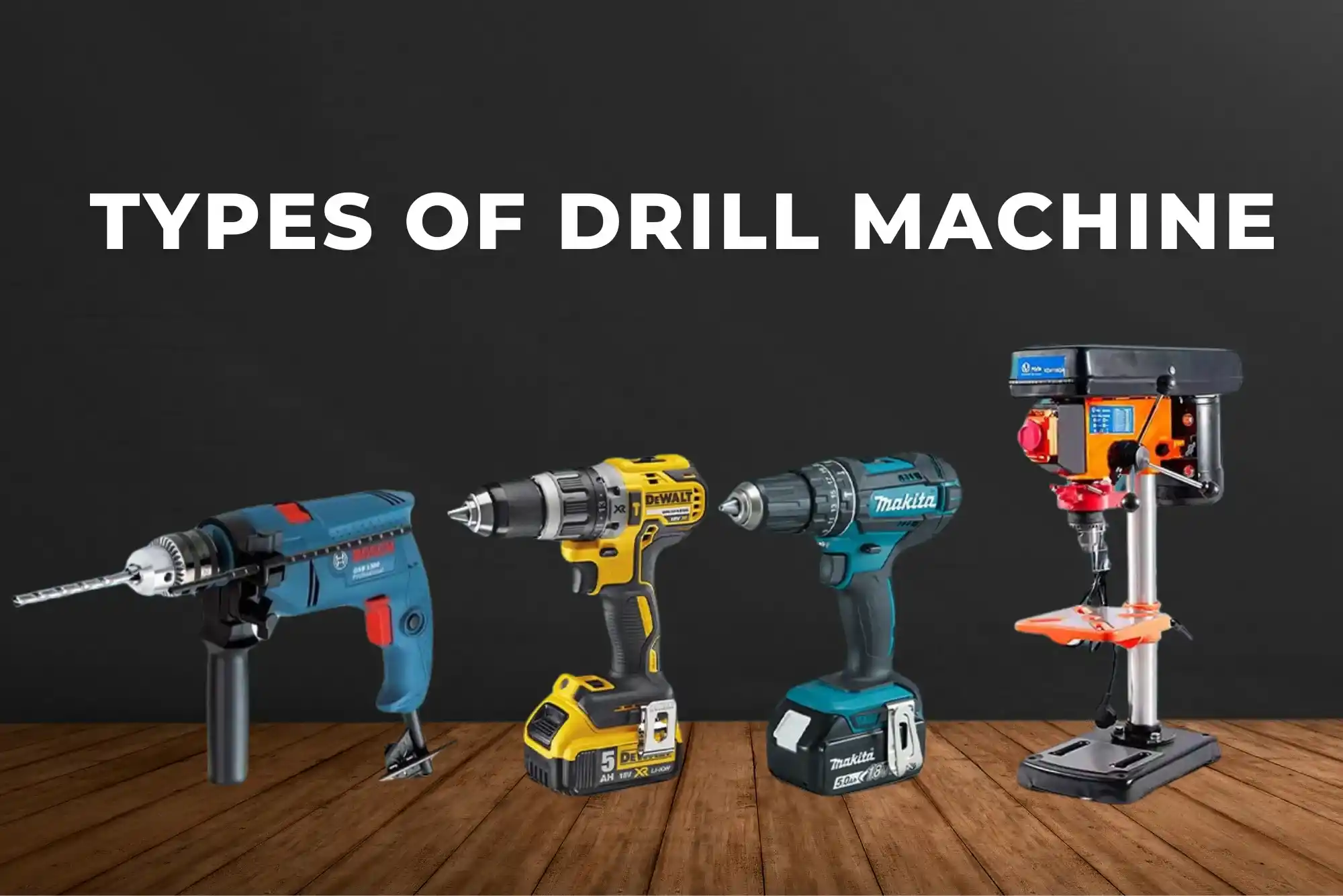Drill machines are essential tools in construction, woodworking, and metalworking. They come in various types, each designed for specific applications. Whether you are a professional contractor or a DIY enthusiast, understanding different drill machines will help you choose the best one for your projects. In this detailed guide, we will explore various types of drill machines, their features, applications, pros and cons, and how to select the right one for your needs.
What is a Drill Machine?
A drill machine is a mechanical tool used to make holes in different materials such as wood, metal, plastic, and concrete. It works by rotating a drill bit at high speeds, cutting through the material efficiently. Drill machines can be manually operated or powered by electricity, batteries, compressed air, or hydraulics.
Common Uses of Drill Machines
- Woodworking
- Metal drilling
- Concrete and masonry drilling
- Precision hole drilling
- Industrial applications
- Home improvement and DIY projects
Types of Drill Machines
Drill machines are classified based on their power source, design, and application. Below are the most common types:
1. Hand Drill Machine
A manually operated drill used for light-duty drilling, ideal for small DIY projects.
- Power Source: Manual
- Best For: Wood, soft metals
- Advantages: No power required, low maintenance
- Disadvantages: Requires physical effort, slow operation
2. Electric Drill Machine
Electric drill machines are widely used due to their efficiency and ease of use.
Types of Electric Drill Machines:
- Corded Drill – Provides continuous power and is ideal for heavy-duty tasks.
- Cordless Drill – Battery-operated, offering mobility and convenience.
- Power Source: Electricity or Battery
- Best For: Wood, metal, plastic
- Advantages: Powerful, versatile, easy to use
- Disadvantages: Corded models require an outlet, cordless models depend on battery life
3. Hammer Drill
A hammer drill uses a hammering action to break through masonry and concrete.
- Power Source: Electricity
- Best For: Concrete, bricks, stone
- Advantages: High impact force, effective for masonry
- Disadvantages: Heavy, noisy, not suitable for delicate materials
4. Impact Drill
Designed for driving screws and drilling tough materials, impact drills generate more torque.
- Power Source: Electricity
- Best For: Heavy-duty screwing, metal and wood drilling
- Advantages: High torque, excellent for construction
- Disadvantages: Expensive, can be overkill for simple projects
5. Pillar Drill Machine (Drill Press)
A stationary drill machine mounted on a stand, used for precision drilling.
- Power Source: Electricity
- Best For: Wood, metal, industrial applications
- Advantages: High precision, powerful motor, stable
- Disadvantages: Bulky, not portable, expensive
6. Magnetic Drill Machine
Magnetic drills have a magnetic base that secures them to metal surfaces for stability.
- Power Source: Electricity
- Best For: Industrial metal drilling
- Advantages: Strong grip, efficient drilling, high precision
- Disadvantages: Heavy, requires a power source
7. Pneumatic Drill
Pneumatic drills are powered by compressed air and used in industrial and automotive applications.
- Power Source: Compressed Air
- Best For: Factory settings, automotive industry
- Advantages: Lightweight, powerful
- Disadvantages: Requires an air compressor, noisy
8. Radial Drill Machine
A large and heavy-duty machine designed for drilling large workpieces.
- Power Source: Electricity
- Best For: Industrial drilling, large-scale applications
- Advantages: Flexible arm movement, powerful motor
- Disadvantages: Expensive, requires a large workspace
9. CNC Drill Machine
Computer-controlled drill machines used for precision drilling in mass production.
- Power Source: Automated (Electricity)
- Best For: Precision engineering, mass manufacturing
- Advantages: Extremely accurate, automated operation
- Disadvantages: Expensive, requires programming knowledge
Comparison Table of Drill Machines
| Drill Machine Type | Power Source | Best For | Mobility |
|---|---|---|---|
| Hand Drill | Manual | Light-duty wood & metal drilling | High |
| Corded Electric Drill | Electricity | General drilling | Low |
| Cordless Electric Drill | Battery | DIY & portable drilling | High |
| Hammer Drill | Electricity | Concrete & masonry | Medium |
| Impact Drill | Electricity | Heavy-duty screwing & drilling | Medium |
| Pillar Drill | Electricity | Precision drilling | Low |
| Magnetic Drill | Electricity | Industrial metal drilling | Low |
| Pneumatic Drill | Compressed Air | Industrial & automotive | Medium |
| Radial Drill | Electricity | Large-scale drilling | Low |
| CNC Drill | Automated | Precision engineering | Low |
How to Choose the Right Drill Machine?
To select the best drill machine, consider these factors:
- Material Type: Ensure the drill is suitable for wood, metal, masonry, or plastic.
- Power Source: Choose between manual, electric, battery, or air-powered drills.
- Portability: Cordless models are best for flexibility, while stationary drills offer precision.
- Application: Determine whether you need it for DIY, industrial, or professional work.
- Budget: Consider cost-effectiveness based on your specific requirements.
FAQs
1. What is the most versatile drill machine?
The cordless electric drill is the most versatile as it offers portability and can handle various tasks.
2. Can I use a hammer drill on wood?
Yes, but it’s best suited for masonry. Using it on wood may cause excessive damage.
3. How do I maintain my drill machine?
Regular cleaning, lubrication, and proper storage will extend its lifespan.
4. What drill machine is best for home use?
A cordless electric drill is ideal for home DIY projects due to its convenience and ease of use.
5. Are pneumatic drills better than electric drills?
Pneumatic drills are powerful and suited for industrial applications, while electric drills are more versatile for general use.
Conclusion
Drill machines come in various types, each designed for specific tasks. By understanding their features, applications, and advantages, you can make an informed decision. Whether you’re a DIY enthusiast or a professional, investing in the right drill machine will enhance your efficiency and project quality. Explore our recommended guides and product reviews for more insights!



